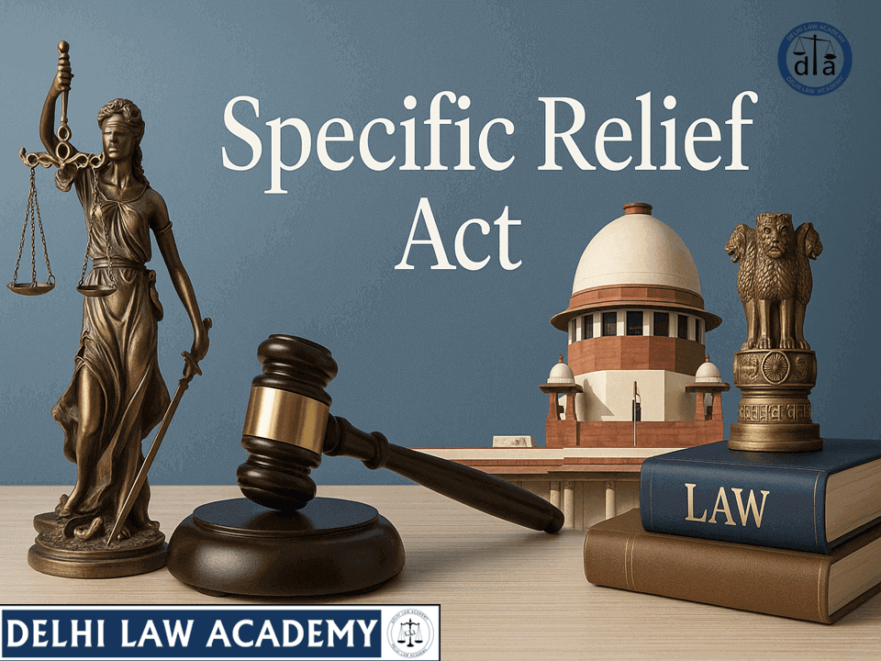
⚖️ CRIMINAL PROCEDURE CODE: ARREST OF PERSONS
📘 TOPICS
- When police may arrest without warrant
- No routine arrests u/s 41(1)(b)
- Arrest only after some investigation…
- Arrest only if it is necessary…
- Duty of the police officer…
- Duty of the Magistrate…
- No mechanical reproduction of reasons…
- Arrests under the SC/ST [Prevention of Atrocities] Act 1989
All these topics are discussed in this post with reference to LANDMARK cases decided by the SUPREME COURT:
- ⚖️ Arnesh Kumar v. State of Bihar [2014]
- ⚖️ Dr. Subhash Kashinath Mahajan v. State of Maharashtra [2018]
🎯 Preparation for RJS, DJS, PCS (J) and other Judicial Service Exams
📖 CRIMINAL PROCEDURE CODE EXPLAINED
The Criminal Procedure Code forms the bedrock of any and every Judicial Service exam in the country. Its thorough knowledge is a must for all aspirants of RJS, DJS, PCS (J) and every other Judicial Service exam.
To help such aspirants, DELHI LAW ACADEMY JAIPUR has launched a series of study material modules on all important aspects of this vital part of their syllabus.
📜 Statutory provisions of CrPC relating to arrests
Section 41(1)
When police may arrest without warrant
(a)
- Without an order from a Magistrate and a warrant: a police officer may arrest any person who commits a cognizable offence in the presence of a police officer.
(b)
- Without an order from a Magistrate and a warrant, a police officer may arrest any person against whom:
- a reasonable complaint has been made, or
- credible information has been received, or
- a reasonable suspicion exists that he has committed a cognizable offence punishable with imprisonment for less than or upto 7 years…
- if the Police officer has reason to believe that such person has committed the offence and he is satisfied that arrest is necessary:
- to prevent committing further offence or
- for proper investigation or
- to prevent disappearance or tampering of evidence or
- to prevent such person from making any inducement, threat or promise to a witness or
- to ensure his presence in Court
- This provision was substituted by the Amendment Act of 2008.
- Police officer shall record reasons in writing while making such arrest.
- He shall also record reasons in writing for not making arrest in cases where arrest is not required.
(ba)
- Without an order from a Magistrate and a warrant, a police officer may arrest any person against whom credible information has been received that he has committed a cognizable offence punishable with imprisonment for more than 7 years or death.
(c) – who has been proclaimed as an offender.
(d) – in whose possession anything is found suspected to be stolen property.
(e) – who obstructs a police officer while in duty or escapes from lawful custody.
(f) – who is reasonably suspected of being a deserter from the Armed Forces.
⚖️ Important Guidelines by the Supreme Court in Arnesh Kumar v. State of Bihar [2014]
🚫 No routine arrests u/s 41(1)(b):
- No arrest should be made only because the offence is non-bailable and cognizable.
- Existence of power to arrest is one thing, justification for its exercise is another.
🔍 Arrest only after some investigation…
- No arrest in a routine manner on mere allegation.
- Reasonable satisfaction, after some investigation, is necessary.
⚠️ Arrest only if it is necessary…
- Police officer must be satisfied that arrest is necessary for reasons under sub-clauses (a) to (e).
- He must ask himself: “Why arrest? Is it really required? What purpose will it serve?”
👮 Duty of the police officer…
- He must state facts leading to the conclusion that arrest was justified.
- He must furnish facts, reasons, and conclusions before the Magistrate.
⚖️ Duty of the Magistrate…
- The Magistrate must be satisfied that the condition precedent for arrest u/s 41(1)(b) has been met before authorising detention.
🛑 No mechanical reproduction of reasons…
- Case diaries should not contain mechanically reproduced reasons for arrest.
- Failure to comply will attract departmental action and contempt of court proceedings.
✅ Conclusion
- Two requirements before arrest:
- Reason to believe that the accused has committed the offence.
- Satisfaction that the arrest is necessary for one or more purposes under section 41(1)(b).
⚖️ Arrests under the SC/ST [Prevention of Atrocities] Act 1989
Directions by the Supreme Court in Dr. Subhash Kashinath Mahajan v. State of Maharashtra [2018]
- In view of the abuse of arrest powers:
- Arrest of a public servant only after approval of the appointing authority.
- Arrest of a non-public servant only after approval by the S.S.P.
- To avoid false implication:
- A preliminary enquiry may be conducted by the DSP to ensure allegations are not frivolous or motivated.
📜 Reversal by Parliament
Amendment of the SC & ST [Prevention of Atrocities] Act – August 2018:
- The investigating officer shall not require approval for arrest if necessary under this Act.
- No procedure other than that provided under this Act or the Code shall apply.
📚 Continue Your CrPC Preparation
Don’t stop here! Strengthen your knowledge of CrPC with our other fully solved tests:
📘 Free Study Material for Judiciary Aspirants!
Download our FREE study material prepared by Delhi Law Academy’s expert faculty.
❓ Frequently Asked Questions on Arrest under CrPC
Under Section 41(1) of the Criminal Procedure Code, a police officer may arrest a person without a warrant if the person commits a cognizable offence in the officer’s presence, or if credible information or reasonable suspicion exists that the person has committed such an offence. However, after the 2008 Amendment and the Supreme Court ruling in Arnesh Kumar v. State of Bihar (2014), arrests cannot be made routinely — the officer must record reasons and ensure arrest is necessary for investigation or preventing evidence tampering.
The Supreme Court in Arnesh Kumar v. State of Bihar (2014) laid down vital safeguards against unnecessary arrests. It directed that:
- No routine arrests should be made for offences punishable up to 7 years.
- Police must record written reasons for arrest or for not arresting.
- Magistrates must verify compliance before authorising detention.
The Court emphasised: “Existence of power to arrest is one thing; justification for its exercise is another.”
Police officers are legally bound to:
- State the facts and reasons justifying arrest.
- Record written reasons for both making and not making an arrest under Section 41(1)(b).
- Produce the accused before a Magistrate with all details supporting the arrest.
Failure to comply can lead to departmental action and even contempt of court.
The Magistrate must carefully examine whether the conditions under Section 41(1)(b) have been met before authorising detention. The Magistrate’s satisfaction must be genuine and recorded; they cannot mechanically approve remand orders. This judicial oversight ensures citizens are not deprived of liberty without lawful justification.
In Dr. Subhash Kashinath Mahajan v. State of Maharashtra (2018), the Supreme Court held that arrests under the SC/ST Act required prior approval of competent authorities to prevent misuse. However, Parliament amended the Act in August 2018 to reverse this, stating that investigating officers do not require prior approval for arrest if the law otherwise permits it. The amendment aimed to restore the Act’s deterrent effect while maintaining procedural safeguards.
The Criminal Procedure Code (CrPC) forms the backbone of procedural criminal law in India. It appears extensively in all Judicial Service exams such as RJS, DJS, PCS(J) and others. Aspirants must master sections on arrest, bail, trial procedures, and powers of courts. Institutes like Delhi Law Academy Jaipur provide structured study material and landmark case analyses to help candidates prepare effectively.
Contact us
📍 Delhi Law Academy – Jaipur Branch
6C, Tower 2, Coaching Hub, Pratap Nagar, Jaipur – 302033
📞 Phone:
+91 9911916552
+91 8447285606
✉️ Email:
contactus@delhilawacademy.com

